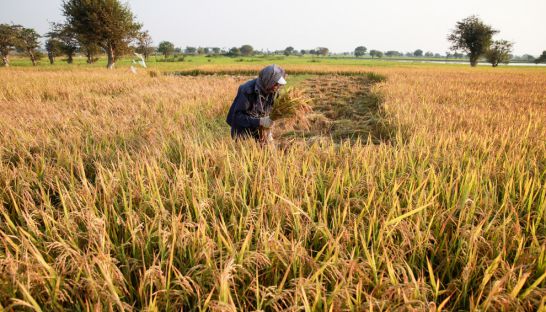Cambodia: Government directs support to rice farmers
The government announced yesterday that it would “intervene” to support the price that farmers receive for their paddy rice, though without instituting a price floor or direct subsidies that would jeopardise a free market.
Vongsey Vissoth, secretary of state at the Ministry of Economy and Finance (MEF), told representatives of the private sector and agricultural cooperatives that the government would take action to prop up the price that local rice farmers receive for their harvest.
He said even though Cambodian farm-gate prices on paddy rice were cheaper than those of neighbouring countries, the price that farmers actually received for the paddy was very low. Moreover, the market price tends to drop off just ahead of the harvest, pressuring desperate farmers to sell their paddy at a slim margin.
“Whenever the harvest season is approaching the price of paddy rice always slumps,” he said.
Chan Sophal, executive secretary of Farmers and Water Net, a Kampong Thom-based agricultural NGO, said rice was a challenging sector for farmers, even when they followed the government’s guidelines on cultivation.
“We cannot understand why local rice millers reject to buy our paddy rice from us, while brokers are ready to buy it,” she said, adding that the brokers are able to purchase the paddy at a lower price because local millers reject to buy it.
Cambodia produced about 5 million tonnes of surplus paddy rice last year, with an estimated 3 million tonnes exported through informal channels.
Vissoth said poor infrastructure and high transport costs resulted in a high mark-up on rice paddy, though hinted that “price-makers” – including millers, brokers and traders – could be “playing with prices” to take higher profits at the farmer’s expense.
He said the government has already approved a $50 million package of low-interest loans to rice millers for purchasing rice paddy and has earmarked an additional $30 million to provide loans to millers for the construction of storage and drying facilities. The measures support Cambodian rice millers and exporters so that they can offer better prices to local farmers, he noted, but now the government will focus on supporting the farmers themselves.
As part of a new initiative, the government will act as an intermediary in negotiating rice prices and will facilitate transport to help farmers lower their logistics costs.
“Provincial governors and authorities will actively intervene in the market failure,” he said. “Authorities will be responsible for keeping tabs on price-makers to ensure that the pricethey offer is fair to farmers, and also to provide assistance in transportation, building new infrastructure and preventing unofficial fees from being charged on transport.”
Vissoth said provincial authorities could dip into the provincial budget to provide these facilities to farmers, and should also provide free transport to help farmers get their rice paddy to local buyers or markets.
“This is a short-term intervention in order to stabilise prices for farmers,” he said. “The policy will put pressure on price-makers to raise the prices they offer farmers.”
Song Saran, CEO of rice miller and exporter Amru Rice, said he welcomed the government’s announcement as it would address some of the factors that were depressing rice prices.
“It is the right direction to address the real issues of the sector to prevent a market failure,” he said, adding that reducing transport costs would improve margins.
“We [millers] cannot control the price of paddy rice as it is based on the market’s supply and demand,” he added.
Source: http://www.phnompenhpost.com/business/government-directs-support-rice-farmers


 English
English




